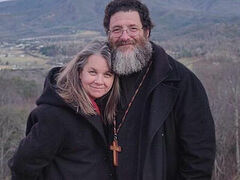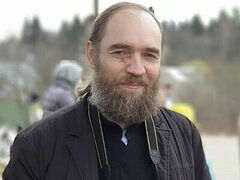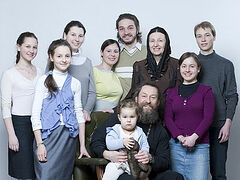Archpriest Vasily Gelevan is a priest of the Church of the Annunciation at the Airborne Forces in Moscow. For eight years Fr. Vasily served in Brazil, where he was the rector of the Church of the holy Martyr Zinaida in Rio de Janeiro. The head of a beautiful and closely-knit family, he has talked about what principles he and his wife Ekaterina are guided by in raising children and how to solve problems that inevitably arise in family life.
 Archpriest Vasily Gelevan with his family
Archpriest Vasily Gelevan with his family
“The most important thing in child raising is to give a personal example”
—Father Vasily, where did you meet your future wife?
—It was in 1996, when independently of each other my future wife and I entered the Theological Seminary in Smolensk. I enrolled in the pastoral department, and she—in the choir directing department.
It often happens that young people meet at an educational institution, make friends, and then become a Christian family. Future pastors are prepared for this: there are special lessons that will help them in the ministry. Girls are taught to direct a church choir, paint icons, and above all to be good wives of priests, good mothers of children and good helpers of pastors in parish life. Everything is not limited to knowledge of music, icon painting or restoration experience. A lot happens in this life. The main thing is that over the period of their studies both should begin to practice their faith and life in the Church. In parallel, they fall in love with each other, as all normal young people do. Then there comes great responsibility, spiritual joy and joy from communicating with each other, from the birth of children and life in general. Joy and gratitude to God. It all starts in a theological institution.
I remember going out on the streets of Smolensk, looking at the tram tracks, at people walking down the street, and wondering how they could live without God and the Church. What’s the meaning of such life? I felt a pity for such people, but they had themselves chosen such a path, they did not know what they were losing by refusing life in the Church and in Christ. At the same time, at such moments I sincerely thanked God: How good it was that I had met a believing girl at the seminary! I didn’t have to worry that she would say someday: “I won’t tolerate this lack of money, this obedience when they send you 10,000 miles away from home for eight years, while I have to be a thread that follows a needle.” I was sure that she would travel with me and would never say that I was not like everyone else and that I had a small salary. I knew for sure that this would not happen, because she was a religious girl.
 Archpriest Vasily Gelevan and his wife Ekaterina —One educationalist said that happy parents have happy children. Was the life of your and your spouse’s parents a model for you?
Archpriest Vasily Gelevan and his wife Ekaterina —One educationalist said that happy parents have happy children. Was the life of your and your spouse’s parents a model for you?
—Yes. They gave us an example of prayer. I know it from experience how important it is when parents pray for their children and when they pray in general. It is vital for a believer, and it really helps. My mother-in-law is such a person. True, she may be very simple and naive in some ways, but she knows firmly that God exists, that He is a living God and works in our lives, and we must pray to Him. She knows it even more firmly than I do. Every conversation with her is spiritual. Everything that happens in her life has only a spiritual dimension for her. She has serious illnesses (may God grant her good health), but she prays for us continuously. And we pray that the Lord will strengthen her; we do everything in our power to comfort and help her. She is a disabled pensioner and can hardly move, but she is moving in one direction—towards God. She has only two paths—to church and home, home and to church. There’s nothing else in her life, and she doesn’t want anything else.
I think about our children: and they look at us, taking our example. There is such a law in our life—for some reason our children pick up all our shortcomings. Of course, I don’t want them to pick up my weaknesses, but this happens automatically. All of my imperfections, as in a mirror, are visible in my children. You should always instill some good, kind and positive traits in children and it requires efforts. For example, if I stop praying, my children immediately stop praying as well. Even worse: If I sit down, they will lie down. If you stand up to pray, your children look at you and imitate you.
We encourage our children to read simple prayers from their childhood. In the evening we all stand up together to pray, and in the morning we also read the rule. Prayer is something very personal, it is difficult to convey, to understand whether you are praying or not. Children should not only be present, but also participate, and this requires practice.
The same goes for our speech, actions, decisions, attitudes to things and convictions: not only moral, but also political. Children are exposed to the influence of the street and liberal media, and at home they are sometimes told the opposite things. I tell them about moral principles, about what sin is, as well as personal beliefs—what our country is, who is a patriot, and what a true believer should be like. Everything is criticized around us, so you have to stand up in defense of your firm beliefs so that there can be no falsehood. If you say one thing and do otherwise, your children will notice it. They are like litmus paper and notice even slight falsity. It’s useless to lie to them. If you have sincere convictions, then you have them. If you try not to sin, it means you really make efforts, and children see it. In parenting the most important thing is to give a personal example. All words fade if your example contradicts what you say. I respect people who say one thing and do... the same thing.
“Choosing for yourself, you choose for your children”
—In Russian fairy tales you’ll find specific tests for fiancés and fiancées: to catch a firebird, to sew a shirt in one night, etc. In the customs of many peoples there are such tests as well; for example, when a future wife cooks soup. Will such tasks help build a good family in our days?
—I believe that the customs that we saw in our ancestors had a practical application and were intended for testing a potential husband or wife. They were veiled in beautiful rituals, wonderful traditions and habits, but in fact it was a test of survival. The mother was expected to be a housewife; she would do the cooking. And not once, but three times a day for many years in a row. Children, especially boys, have good appetites. It’s good if a girl knows how to cook, and most importantly, to have a positive, calm attitude to this. It’s great if a future wife is taught this as a child and is supported, and this skill develops. She will understand that it is a vital part of life.
It is also good if a future husband is aware of his responsibility to the family, understanding that he is obligated to be the breadwinner, as has been the case since the most ancient times when human society was just being formed. And so it remained when the Lord Jesus Christ became incarnate. All the apostles labored. The Apostle Paul had a specific profession: He cut leather belts and wove baskets and tents from them. The great missionary, who could afford not to care about anything at all and could be fed everywhere, had his own profession. He realized a simple thing: Through physical labor we get to know God. Relaxing is bad even for your health. All hernias, protrusions develop when we move very little. Doctors constantly tell us that we should move a lot, and we return to the clear commandment that was given to man after the fall: In the sweat of thy face shalt thou eat bread (Gen. 3:19). As long as we live on earth, we must work hard. It’s not a curse, but a blessing. If we have found another profession and earn a living by intellectual work (art etc.), that’s fine, but we become less physically active. But it is necessary for us to stay physically active.
The father must work and be the head of the family, so that the mother can always consult with him. This is harmony: the husband is at the head of the family. At the same time, no one loves this woman as much as the husband does. He loves her so much that he is ready to lay down his life to make her happy. This is harmony: He is a father, she is a mother and his beloved woman.
—And yet, how can young people get to know their special ones better in modern conditions?
—There is a period of romance when each tries to show himself in the best light. The future lady of the house demonstrates her qualities, and the future breadwinner shows himself as a diligent master of the house, as a faithful friend, showing his generosity not at his parents’ expense. He earned it himself and can flaunt it. This is his right—a man is seeking his beloved’s hand. Everything in the perspective of family life is taken into consideration: the way he behaves in company, how communicates with friends, etc.
I would give this advice to young people in order to test each other: Go to visit their parents. You look at his or her mother and father and figure out what your fiancé or fiancée will be like in some years, because, unfortunately, children often repeat the mistakes of their parents; but at the same time, the older generation can instill virtues in their sons and daughters. If you see that one or another virtue has blossomed in the father, you know that his son has tasted this joy too—like father, like son. Accordingly, both sins and virtues are repeated. As I said, it is easy to pass on sins and it is hard to pass on virtues; nevertheless, parents teach us a lot. We take after our mothers and fathers. When there is a saint, a confessor of the faith in the family who prays for his descendants, it is a blessing for the whole family. When there is a new martyr among someone’s relatives, he prays, and you understand that this family is blessed by God.
And it’s also true the other way round—how difficult it is for a person to live if there is a grave sinner in his family. For instance, suicide is a terrible sin: suicides are not even buried in the church graveyard. When a suicide’s son faces difficulties in life, the door to the abyss is already open in front of him. He may think: “My father committed suicide, so I can enter this door too.” Why? Because someone has already opened it before him. Choosing for himself, the first suicide prepared a temptation for his offspring.
The same can be said about fidelity in marriage: when you are faithful to your spouse, you don’t choose only for yourself, but also for your children. Or if the wife forgave her husband who is filled with remorse, giving him a chance to live on together, thereby preserving the family, this means that the children have the right to see both parents every day, and not just listen to some stories about their father, good or even bad. They can wake up and say, “Good morning, Dad! Good morning, Mom!”, and say in the evening: “Daddy, good night! Dear Mommy, good night!” The children will hug them both and go to sleep in peace. That’s very precious. Choosing for yourself, you also choose for your children. And not only for the present, when they are small, but also for the future, when they face problems in their family life. When faced with problems, a son will say to himself: “My father preserved the family, and I must do the same. If he could do it, so can I.” And likewise, an adult daughter will decide: “My mother separated from my father, and I will do the same. Why not? She did it, so I can do it too.” We answer not only for ourselves, but also for our children.
To be continued…



